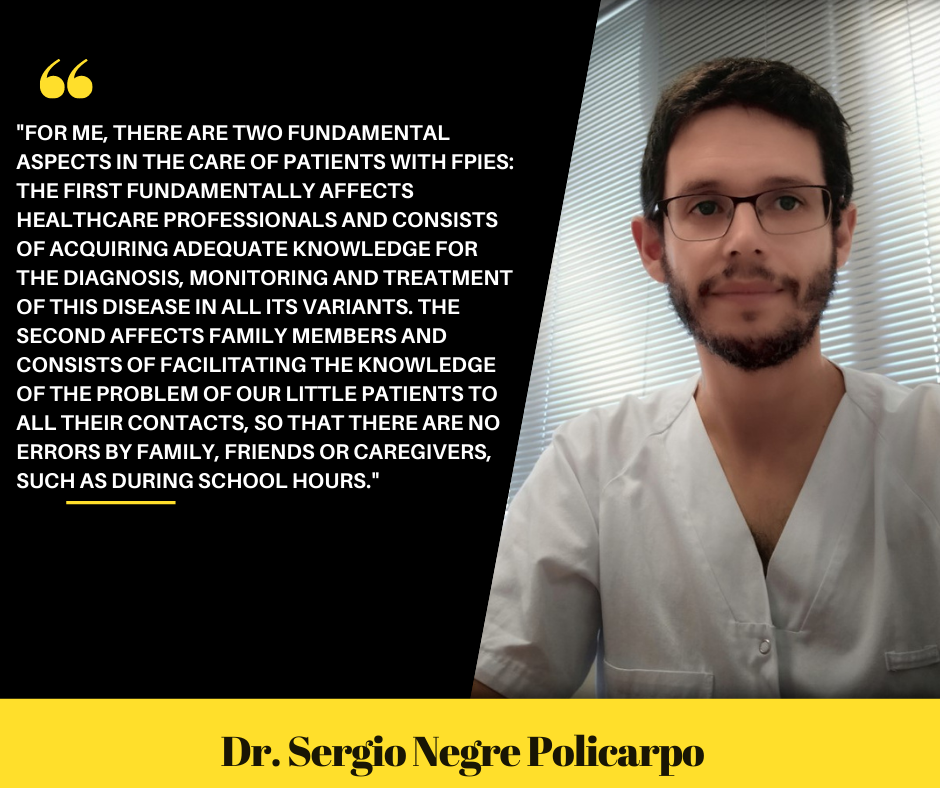Global FPIES Day is always a great time to educate ourselves further about the various aspects of living with FPIES, and Global FPIES Day 2020 was no exception! We hosted a great group of presenters who offered some fascinating insights for us all. Over the next few months, we will be learning more about this great group of professionals, and we would love for all of you in our FPIES community to get to know them a bit better!
Recently, I had a great chat with Dr. Sergio Negre Policarpo, one of our esteemed medical advisory board members at The FPIES Foundation, who practices in Spain. His work is inspiring and his passion for his patients is clear! Please join me as we get to know him a bit better in today’s “Meet the Presenter” interview!
Amanda: You have been an important member of the Medical Advisory Board at The FPIES Foundation for several years, and we are so grateful for the work that you do to help families and their children affected by FPIES! What was it that led you to be interested in FPIES?
Dr. Sergio: My interest in FPIES began 15 years ago, after attending a 2-years-old boy with profuse vomiting, bloody diarrhea and fever in the Pediatric Emergency Room, who was initially diagnosed by pediatricians with intestinal-origin sepsis.
During that night, I remembered having studied similar cases and tried to convince my colleagues that it was a case of acute FPIES and that the treatment the patient was receiving was not adequate. The next day, a pediatrician in the hospitalization ward listened to me and the child began to improve rapidly.
Since then, there have been many cases that I have attended, all of them different for various reasons, but in many cases they share the delay in diagnosis due to the lack of knowledge of this pathology.
Amanda: You seem very passionate about your practice! What do you enjoy most about your work with patients?
Dr. Sergio: What I like most about my profession is direct contact with children, with their characteristic joy and vital force. In the specific case of children with FPIES, it gives me great satisfaction to be able to offer families a little light along the way. Usually the journey they have made through different hospitals and doctors has partly made them lose hope of finding out what exactly is wrong with their child and how to solve it. Being a guide for them is a privilege for me.
Amanda: That guidance is so essential and so appreciated! In your opinion, what is the most important aspect of caring for patients diagnosed with FPIES?
Dr. Sergio: For me, there are two fundamental aspects in the care of patients with FPIES: the first fundamentally affects healthcare professionals and consists of acquiring adequate knowledge for the diagnosis, monitoring and treatment of this disease in all its variants. The second affects family members and consists of facilitating the knowledge of the problem of our little patients to all their contacts, so that there are no errors by family, friends or caregivers, such as during school hours.

Amanda: You recently launched a really fascinating YouTube Channel. I have watched several videos and the content is really interesting! Could you tell us about this project?
Dr. Sergio: The idea for this project arose during the hardest stages of confinement due to the COVID to which we were subjected in the months of March, April and May in Spain. Many patients could not be seen in person, so we had to urgently start a telemedicine system that was previously not functional.
It was then that I became aware of the need for many parents to seek reliable information about their children’s digestive health problems. The more and better informed parents, the better care their children receive.
In this context, it is not easy to distinguish reliable information from biased or incorrect information within the immense world of the internet, so creating a YouTube channel focused on informing about these problems was the next step for me.
Amanda: What was involved in your channel launch?
Dr. Sergio: The launch of the channel was relatively simple, since I oriented it to the patients I attended in the pediatric gastroenterology office, so that they could access the information that we had previously shared at any time. After a few days the idea expanded and little by little we were producing videos about various pathologies, among which food allergy, FPIES and pediatric inflammatory bowel disease have a particular space.
The objective is to achieve a participatory channel that reaches all patients who need it, and that allows parents to make informed and consensual decisions. Today, doctors should not have a paternalistic attitude, but rather guide and share, educate and adapt our knowledge to the particular reality of each family.
Medicine is changing by leaps and bounds and new technologies are not a threat, but a very useful tool to improve the health of families.
Amanda: I am sure that there are a lot of families and providers that will benefit from viewing the information you are offering! Who do you most hope to educate through your videos?
Dr. Sergio: I believe that it is preferable to create short videos, 2-10 minutes long, in which specific topics are dealt with about the different pathologies that affect the digestive system of children, than longer and complex videos. In this sense, the topics to be discussed will be very specific and explained in a simple, easily understandable language. In any case, I appreciate the active participation in the channel and I attend the requests that the subscribers make, since they are the most important element.
Shortly, I will start a new section in which I will expose news that has occurred in the last month in the field of research. In this sense, the first video in this section will be dedicated to the treatment of anemia in inflammatory bowel disease.
Of course, in the FPIES field all your suggestions will be taken into account.
Amanda: That is really great to hear—I will be sure to check out the research news as well! Where can the FPIES community find your channel? Are there subtitles available in different languages?
Dr. Sergio: You can find the channel in the following url:
https://www.youtube.com/channel/UCcSpr4VULhNLr7HxIzJFZXQ
We will progressively activate subtitles in different languages, so that we can help more families from different parts of the world.
It is necessary to take into account the complexity of covering so many diverse topics while using the limited time available between patient care in the office, clinical and laboratory research and teaching at the university.
Amanda: Thank you so much for speaking with us today in this interview and as always, thank you to your commitment to the FPIES community! I will be sure to continue following your channel, and I look forward to learning more from your videos!
Is there anything else you would like to add?
Dr. Sergio: I just wanted to thank you for all that you do for children with FPIES, not just in America, but around the world. You are a beacon of inspiration. Thank you sincerely. You are true heroes.
This post was written by Amanda LeFew, Co-Director of The FPIES Foundation


